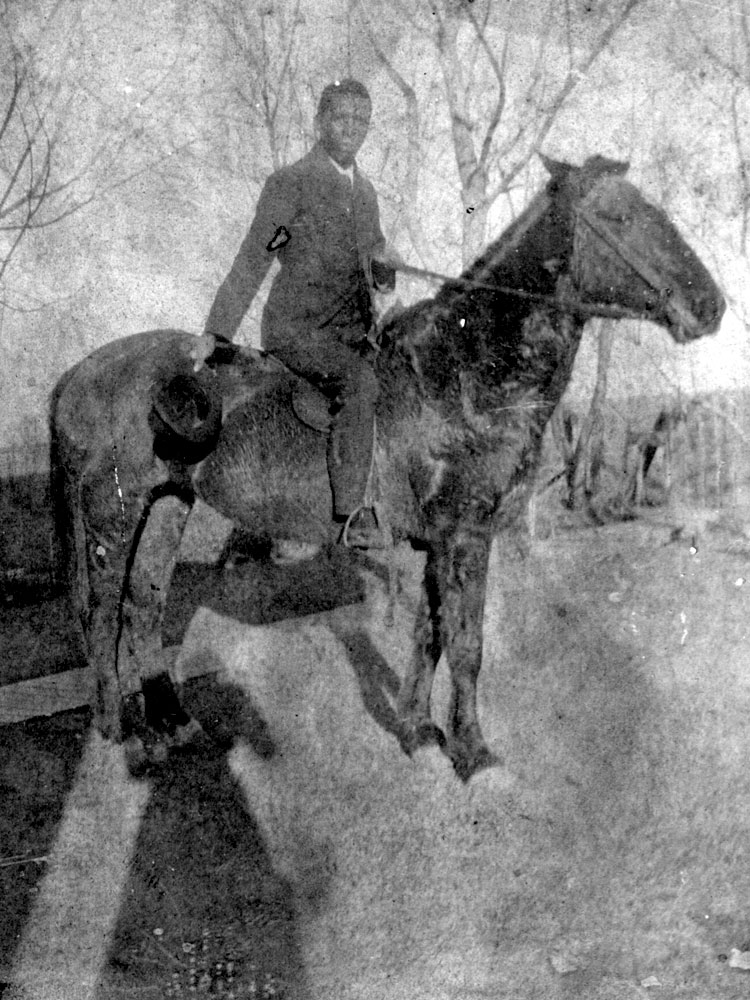On December 4, 1899, Paul Laurence Dunbar was billed for renting and boarding a horse in Denver, Colorado. Following the advice of doctors, Paul went to the Rocky Mountains seeking relief from tuberculosis. Traveling with him were his wife Alice and mother Matilda.
Jockey Stables
Livery, Boarding, Sale and Feed Stable
To hire horse 5 days, ending 12-4, '99 $5.00
To Boarding horse 11 days, ending 12-2, '99 $3.85$8.85
Livery bill, December 4, 1899. Paul Laurence Dunbar Papers, Ohio History Connection (Microfilm edition, Roll 2).
While Paul was in Colorado, he recited his poetry to a large crowd at a Denver church. Included on the program was a humorous dialect poem called "Dat Ol' Mare o' Mine," which describes a decrepit but faithful old horse.
Paul Laurence Dunbar, famous especially for his humorous and pathetic dialect pieces, is to read from some of his own writings, published and unpublished, at Trinity Methodist Episcopal Church tomorrow evening. He will be assisted by the College of Music, University of Denver. The program is as follows:
The Poet and His Song
In the Morning
A Coquette Conquered
Aunt Tempy's Triumph
Dat Ol' Mare o' Mine
The Party
"Dunbar's 'Poet and His Song.'" The Denver Post (Denver, Colorado). January 29, 1900.
Yes, huh coat ah long an' shaggy, an' she ain't no shakes to see;
Dat's a ring-bone, yes, you right, suh, an' she got a on'ry knee,
But dey ain't no use in talkin', she de only hoss fu' me,
Dat ol' mare o' mine.
W'en my eyes commence to fail me, dough, I trus'es to huh sight,
An' she'll tote me safe an' hones' on de ve'y da'kes' night,
Dat ol' mare o' mine.
Excerpt from "Dat Ol' Mare o' Mine" by Paul Laurence Dunbar. Published in Lyrics of Love and Laughter (1903).
Many years later, Alice recalled the Colorado horse that was Paul's inspiration for "Dat Ol' Mare o' Mine."
"Dat Ol' Mare" was a weird and eccentric maiden horse of uncertain age and dubious ancestry, whose ideas were diametrically opposed to any preconceived notions one might suppose horses in general and Colorado horses in particular to have. But she would come home "on de ve'y da'kest night," without guidance, even if she did betray doubtful pre-ownership in the daytime when an exasperated and embarrassed woman drove her into Arapahoe street, at the end of the ranch road, upon which street she would make frequent, unpsychological and embarrassing stops.
"The Poet and His Song," by Alice Moore Dunbar. Published by Reverdy C. Ransom, reprinted from The A. M. E. Church Review (Philadelphia, Pennsylvania). October 1914. Page 15.

Paul on horseback (note the shadow of the photographer, possibly Alice in a long dress). Courtesy of the Ohio History Connection. Paul Laurence Dunbar Collection, P 70; Box 1, Folder 2. Image AL05260.tif.
Alice also wrote a fictional account of her relationship with Paul (whom she called Gerald in the story) and described how they rode horses together in Colorado.
I loved the Rocky Mountains. Here I had Gerald to myself, for awhile, at least. Our wants were few in our little ranch house, on the edge of the plains, with a view of a curving sweep of the snow-capped Rockies, from Pike's Peak to Long's Peak, a hundred and fifty miles of grandeur. Gerald slowly won his way back to health. We rode horseback together. He hunted jackrabbits and climbed the foothills. At nights we read and talked together, and some of the camaraderie of which I had dreamed came to our lives. It was glorious, early in the mornings to scamper across the plains on our sturdy ponies, followed by the big sheep dogs, which were a part of the outfit of the tiny ranch. We learned how to build campfires, and laughed at our efforts to toss flapjacks in the frying pan in accepted cowboy fashion.
"No Sacrifice," by Alice Dunbar-Nelson. The Works of Alice Dunbar-Nelson, Volume 3. Edited by Gloria T. Hull. Oxford University Press (New York, New York). 1988. Page 217.
